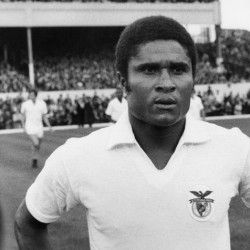
My interactions with Eusebio: A tribute to the Black Panther

I had the privilege of meeting the late, incomparable Eusebio da Silva Ferreira (popularly known as Eusebio) thrice at various international tournaments. I found him a friendly, humble and amiable man, despite his fame as one of the all time greats in football and with one of the most powerful shots in the history of the game.
We first met on Jan 20, 1990 at the Salt Lake stadium in Kolkata when Olimpia (Paraguay) beat Gimnasia De la Plata (Argentina) in the Nehru Club Cup final. He was happy to be in the city of Mother Teresa and was also impressed that an Indian club Mohammedan Sporting (with future Nigerian World Cup player Emeka Ezeugo in their ranks) had reached the semi finals and beaten teams like Metallist Kharkov (Ukraine) and Zambia XI in their group matches.
Mohammedan Sporting had won both these matches 1-0 and lost just 0-1 to a penalty goal to ultimate winners Olimpia and so Eusebio had commented that the team Indian club team had a good defence.
Next we bumped into each other on 23 June 1996 at Villa Park, Birmingham, where he was very depressed to see Portugal lose 0-1 to Czech Republic in the Euro 1996 quarter finals. Portugal with famous players like Rui Costa and Luis Figo in their team were fancied for the title but faltered, due to lack of a goal-poacher.
The Portuguese media kept peppering Eusebio with questions of why his country lacked great finishers. Always polite and mild-mannered, Eusebio did not criticize Helder or Paulo Sousa (Portugal’s strikers) but with a wry smile did say, “You win matches in football by scoring goals.”
Our next meeting took place at the Amsterdam Arena on 24 June 2000. Portugal had just beaten Turkey 2-0 in the Euro 2000 quarter finals and Eusebio was witnessing the match as the lifelong ambassador to Benfica and Portugal national team. I would like to share some of the memories of my conversation with him during these three meetings.
Eusebio belonged to an age of innocence. Great players did not have agents and they were not constantly surrounded by TV cameras eager for a byte. They were paid well but not exorbitantly, did not have celebrity life styles and were much more accessible to fans and media alike.
The Mozambique born striker often laughingly said he would have never been famous but for a chance meeting between two coaches in a barbers shop in Lisbon. Carlos Bauer, an elegant right midfielder, who played for Brazil in the 1950 World Cup, had a decade later become a coach. In 1961 Bauer had taken a Brazilian team for a tour to Africa.
On their way back they stopped at Lisbon. There Bauer met Bela Guttmann, the wily Hungarian Jew who coached Benfica. Bauer had been Guttman’s player when the latter had coached Sao Paolo of Brazil. They both met at a barber’s shop and whilst having their hair cut chatted about football.
Bauer eulogized Eusebio, who was then a precocious teenager known for his blistering shots and explosive runs down the flanks. Initially Guttmann was hesitant. But he met Bauer again the next day and got convinced.
The rest as they say is history. The astute Guttmann persuaded Benfica to sign the raw but powerful Eusebio for just $20,000. It was considered a gamble for a nineteen year old striker. Also over fifty years ago, European clubs rarely recruited African players. In fact Portugal set the trend.
The world of European club football was very different then. Teams did not consist of multicultural players. In fact Benfica had a policy to recruit only players from Portugal and its colonies.
The Benfica management were initially hesitant but then agreed because they valued Guttmann’s judgment. Also African players had started making a mark in Portugal. The first to do so was Mario Coluna also from Mozambique who played as both left striker and later as left half back. His left-footed shooting was almost as ferocious as Eusebio’s with his right. Coluna had starred in Benfica’s memorable 3-2 win over Barcelona in the 1961 European Cup Champions Cup final at Berne in Switzerland. He scored the vital third goal.
Guttman could spot talent and had also introduced another African player, Jose Aguas, the centre forward from Angola. He was quick in thought and movement and excelled in playing with his back to the goal. Another Angolan to join Benfica was inside forward Joaquim Santana.
So the process of recruiting African players for European clubs was started by Guttmann. Didier Drogba, Yaya Toure, Michael Essien and numerous other contemporary African footballers in the Premiership and other European leagues owe their careers to a trend started by this visionary Hungarian coach of Benfica.